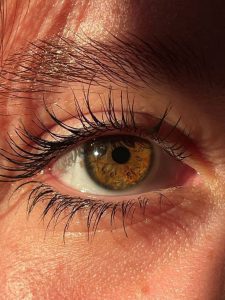Introduction
Most people know stress can trigger headaches, fatigue, or even high blood pressure — but very few realize that stress also affects your eyes by having a direct impact to your vision.
From eyelid twitching to blurred vision, stress doesn’t just affect your mood; it can literally change the way you see the world.
At Credible Eye Care, we regularly meet patients who believe they need new glasses, only to discover that their symptoms are caused by stress-related eye strain rather than a change in prescription.
In this article, we’ll break down the surprising ways stress affects your eyes, provide simple relief tips, and show you when it’s time to see an eye doctor.

How Stress Affects Your Eyes: Top Vision Symptoms to Watch For
1. Eye Twitching (Myokymia) Caused by Stress
That random, annoying eyelid spasm? It’s often triggered by:
-
emotional stress
-
fatigue
-
excessive caffeine
-
poor sleep
While harmless, stress makes the muscles around the eye fire involuntarily, causing twitching that may last minutes or days.
2. Blurry or Fluctuating Vision From Stress and Anxiety
When you’re stressed, your body releases adrenaline, which can temporarily alter how your pupils respond to light. This may lead to:
-
blurred vision
-
difficulty focusing
-
sensitivity to bright light
This effect is usually temporary but can be alarming.
3. Stress-Induced Eye Strain (Asthenopia)
Stress makes you subconsciously tighten the muscles around your face and eyes. Over time, this results in:
-
pressure around the eyes
-
headaches
-
soreness
-
difficulty concentrating
When combined with long hours on digital devices, the strain becomes even worse.
4. Dry Eyes Triggered by Stress
During stressful moments — especially when staring at screens — people blink less frequently. Reduced blinking leads to:
-
dryness
-
burning sensations
-
a gritty or sandy feeling
-
watery eyes (reflex tearing)
Chronic dryness can even affect the quality of your vision.
5. Vision Disturbances Related to Stress
In severe or prolonged stress, some people experience:
-
increased floaters
-
flashes of light
-
temporary visual fatigue
-
difficulty adjusting between near and far sight
Although stress can trigger these symptoms, it’s important not to ignore them.
When Stress Affects Your Eyes — and When to See a Doctor
While occasional stress-related eye issues are normal, you should seek urgent eye care if you experience:
-
-
persistent blurred vision
-
constant eye pain
-
redness or swelling
-
sudden onset floaters or flashes
-
double vision
-
loss of vision
-
These signs may indicate an underlying eye condition that requires professional attention.
At Credible Eye Care, our optometrists and ophthalmic team can perform a comprehensive eye examination to rule out diseases such as glaucoma, dry eye disease, retinal tears, or refractive changes.

Simple Tips to Relieve Eye Stress
✔ Follow the 20-20-20 Rule
Every 20 minutes, look at something 20 feet away for 20 seconds.
✔ Get Quality Sleep
Your eyes need proper rest to recover from daily strain.
✔ Stay Hydrated
Dehydration worsens dryness and visual discomfort.
✔ Blink More During Screen Time
Conscious blinking helps re-lubricate the eyes.
✔ Manage Your Stress
Try deep breathing, prayer, listening to calming music, stretching, or taking a short walk.
✔ Visit an Eye Doctor Regularly
Routine check-ups help prevent long-term vision problems.
Conclusion
Your eyes are more than just windows to the world — they often reflect your state of mind. When life becomes stressful, your vision can feel the impact through twitching, dryness, strain, or even blurred sight.
By managing stress, practicing healthy eye habits, and scheduling routine eye exams, you protect both your mental well-being and your vision.
At Credible Eye Care, we’re always here to help you see clearly — not just with your eyes, but with peace of mind.
